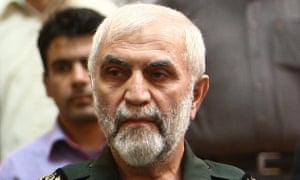The Guardian

Link
A senior Iranian Revolutionary Guards commander has been killed in Syria in an incident that sheds light on Tehran’s growing, shadowy role in bolstering Bashar al-Assad’s regime.
The Iranian forces confirmed on Friday that Hossein Hamedani, described as an elite and exceptional commander and a defender of the Shia holy sites in Damascus, was killed in the vicinity of Aleppo on Thursday evening.
He was the most senior Iranian military officer on a foreign operation to be killed in 36 years since the 1979 Islamic revolution. His death comes at the time when Russia, Tehran’s regional ally, has launched a military campaign in Syria in support of Assad, adding an entirely new dimension to an already bruising conflict.
Tasnim, an Iranian news agency affiliated to the guards, said Hamedani was operating in “an advisory capacity” when “takfiri terrorists” killed him, but it did not disclose the exact details surrounding his death, and it was not possible to verify the claim. A takiri is a Sunni Muslim who accuses another Muslim of apostasy, and is Iran’s terminology when referring to Islamic State.
The extent of Tehran’s military involvement in Syria is not clear but the increasing number of Iranian deaths and funeral ceremonies has revealed its continuing support for Assad. A number of sources told the Guardian that funeral processions for returning Iranian forces from Syria held in Tehran and other major cities have been conspicuous in recent months. Iran also backs Russia’s airstrikes and is reported to have given Russian fighter jets access to its airspace.
Morad Veisi, an Iranian analyst with Radio Farda in Prague who has given lectures in Tehran on the role of the armed forces, said Hamedani’s death demonstrates how far Iranian leaders are prepared to go to defend Assad.
Hamedani’s military ranking in the guards was a level similar to those held by the elite force’s heads of ground and air forces. He was a veteran commander from the Iran-Iraq war in the 1980s and had fought in battles against “anti-revolutionaries” in Iran’s Kurdistan region. Tasnim said he had been previously based in the Iraqi city of Najaf.“Like at the time of Iran-Iraq war when you saw very senior Iranian commanders being present in battlefronts and killed in combats, you now see them in the heart of Syrian combats alongside ordinary officers, it shows how much Iran is putting in to bolster Assad,” he said.
Iran appears to have stepped up its military campaign in Syria after the Russian airstrikes, Veisi said, with the number of ground operations in Idlib and Hama increasing. “I think Iran’s will supporting Syria has become firmer in the wake of Russian involvement and when you refer to Iranian agencies associated to the Guards, you see more reports of funeral ceremonies in recent weeks, especially among Iran-based Afghan expatriates.”
Veisi was referring to Fatemioun Bridge, an Iranian military unit consisting of Shia Afghans living in Iran whom Tehran has dispatched to fight in Syria. Iran has held at least one major conference this year honouring Afghan expatriates killed in Syria.
Ali Alfoneh, senior fellow at the Foundation for the Defence of Democracies, who tracks the number of Iranian deaths in Syria, said the death count has been particularly high in 2015, with as many as 6o to 70 Iranians killed, compared to a total of 140 killed since the conflict began. “In the course of the past three years, this year has been a very active year for the Revolutionary Guards and this can be detected by counting the number of Iranians killed in combats in Syria,” he said.
He said there are conflicting reports among Iranian sources whether Hamedani still held his hitherto senior position in Syria at the time of his death. According to an Iranian opposition website, he was demoted recently because of a dissatisfaction in Tehran about the guards’ conduct in Syria.“But when it comes to the activity of the guards in the wake of the Russian involvement, it’s too early to say, because we only get the information at the time when there is a martyr burial in Iran and that data has not arrived yet. In one or two week’s time we will know.”
During the funeral ceremony in January for Mohammad-Ali Allahdadi, another member of the Revolutionary Guards killed in Syria, Hamedani had said he was prepared for martyrdom.
“Allahdadi’s friends are waiting [for martyrdom] like him, and those of us who are left are ready to fight the enemies of Islam and those making sedition and war,” he was quoted as saying by Tasnim. “We are ready today to follow the red path of martyrdom and people of our country are fond of martyrs.”
In February 2013, another senior Revolutionary Guards figure, Gen Hassan Shateri, was killed while travelling from Syria to Lebanon. Iran blamed his death on “the agents and supporters of the Zionist regime”.
Syria gives Iran physical access to Lebanon and Hezbollah, which is strategically important for Tehran’s leaders because of the group’s geographical position in respect to Israel. Iran does not recognise Israel as a country and usually refers to it as “the Zionist regime”.

No comments:
Post a Comment